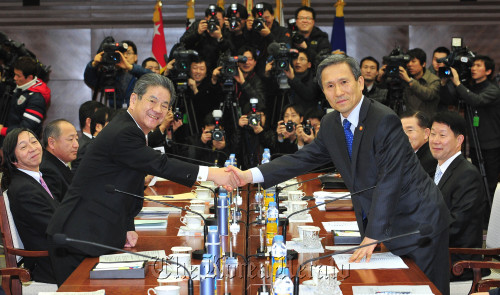South Korean and Japanese defense ministers agreed to “expand and deepen” bilateral military cooperation during talks in Seoul on Monday, amid heightened tensions following a series of deadly North Korean attacks last year.
Defense Minister Kim Kwan-jin and his Japanese counterpart Toshimi Kitazawa also exchanged views on regional security issues including North Korean nuclear threats, the Ministry of National Defense said.
“Concurring that a series of North Korean provocations such as the artillery attack on Yeonpyeong Island and the unveiling of its uranium enrichment program cannot be tolerated, and that they undermine peace and stability in Northeast Asia, the two countries have decided to closely cooperate,” the ministry said in a press release.
“The talks served as an opportunity to develop bilateral military ties to a higher level and are expected to contribute to establishing a ‘mature partnership’ between the two countries.”
 |
Defense Minister Kim Kwan-jin (right) shakes hands with his Japanese counterpart Toshimi Kitazawa at the start of their talks in Seoul on Monday. (Chung Hee-cho/The Korea Herald) |
Kitazawa arrived here earlier in the day to pay a reciprocal visit. Former Defense Minister Lee Sang-hee visited Japan in April 2009 for talks with his then counterpart Yasukazu Hamada. Kitazawa is the first Japanese defense chief to visit Seoul since Japan upgraded its defense agency to the Ministry of Defense in January 2007.
During the talks, the two ministers decided to start “concrete” consultations on reaching an agreement for bilateral cooperation in exchanging military supplies and services such as food, fuel and transportation during peacetime operations including disaster rescue efforts and other humanitarian operations.
They also agreed to consult over reaching a separate agreement that would facilitate sharing sensitive military information, particularly regarding North Korean nuclear weapons and other weapons of mass destruction.
The two envisioned agreements drew intense attention here, sharply dividing public opinion.
Military officials and security experts here said that South Korea needs to establish such military cooperation pacts with Japan at a time when both are sharing the threat of continuing North Korean provocations. They also said the pacts will help improve multilateral security cooperation in Northeast Asia.
However, the Seoul government has apparently been cautious about signing any military pacts with Japan to avoid agitating the general public, many of whom still harbor a deep-rooted bitterness toward Japan for its 1910-1945 colonial rule of the Korean Peninsula.
Some critics claimed that the signing of such pacts with Japan could reignite Cold-War tensions in Northeast Asia.
They said the envisioned pacts would invite angry resistance from China and Russia, and further ratchet up regional tensions ― which have already been aggravated by the two North Korean attacks on the South last year that together killed 50 South Koreans, including two civilians.
“The strengthening of military cooperation between South Korea and Japan, which is obviously targeting North Korea, China and Russia, will encourage China and Russia as well as the North to build up more military strength and increase tensions with China and military threats around the Korean Peninsula,” a local association of military veterans said in a statement.
Dismissing media reports that the agreements might be inked within this year, a military official said, “The two countries only share a common understanding over the signing of the two pacts at this rudimentary stage. It remains unclear whether the pacts will be signed this year.”
South Korea already has pacts or memorandums of understanding over the protection of military secrets with 21 countries. It also has agreements regarding the bilateral assistance in terms of military supplies and services with eight countries.
During the talks between the South Korean and Japanese defense chiefs in April 2009, Seoul and Tokyo signed a “letter of intent” on comprehensive military cooperation, but no formal military pact has so far been reached.
On Tuesday, Kitazawa is scheduled to visit the Joint Security Area in the Demilitarized Zone, a buffer zone dividing the two Koreas, and the Navy’s Second Fleet Command in Pyeongtaek, Gyeonggi Province, where the wreckage of the torpedoed South Korean warship Cheonan is displayed.
By Song Sang-ho (
sshluck@heraldcorp.com)


![[Herald Interview] 'Korea, don't repeat Hong Kong's mistakes on foreign caregivers'](http://res.heraldm.com/phpwas/restmb_idxmake.php?idx=644&simg=/content/image/2024/11/13/20241113050481_0.jpg)

![[KH Explains] Why Yoon golfing is so controversial](http://res.heraldm.com/phpwas/restmb_idxmake.php?idx=644&simg=/content/image/2024/11/13/20241113050608_0.jpg)



